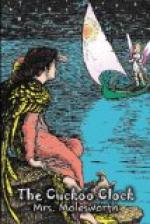“She wouldn’t like you to be out so late, I’m sure,” said Griselda in distress, “and it’s most my fault, for I’m the biggest. Now, which way shall we go?”
They had followed the little path till it came to a point where two roads, rough cart-ruts only, met; or, rather, where the path ran across the road. Right, or left, or straight on, which should it be? Griselda stood still in perplexity. Already it was growing dusk; already the moon’s soft light was beginning faintly to glimmer through the branches. Griselda looked up to the sky.
“To think,” she said to herself—“to think that I should not know my way in a little bit of a wood like this—I that was up at the other side of the moon last night.”
The remembrance put another thought into her mind.
“Cuckoo, cuckoo,” she said softly, “couldn’t you help us?”
Then she stood still and listened, holding Phil’s cold little hands in her own.
She was not disappointed. Presently, in the distance, came the well-known cry, “cuckoo, cuckoo,” so soft and far away, but yet so clear.
Phil clapped his hands.
“He’s calling us,” he cried joyfully. “He’s going to show us the way. That’s how he calls me always. Good cuckoo, we’re coming;” and, pulling Griselda along, he darted down the road to the right—the direction from whence came the cry.
They had some way to go, for they had wandered far in a wrong direction, but the cuckoo never failed them. Whenever they were at a loss—whenever the path turned or divided, they heard his clear, sweet call; and, without the least misgiving, they followed it, till at last it brought them out upon the high-road, a stone’s throw from Farmer Crouch’s gate.
“I know the way now, good cuckoo,” exclaimed Phil. “I can go home alone now, if your aunt will be vexed with you.”
“No,” said Griselda, “I must take you quite all the way home, Phil dear. I promised to take care of you, and if nurse scolds any one it must be me, not you.”
There was a little bustle about the door of the farmhouse as the children wearily came up to it. Two or three men were standing together receiving directions from Mr. Crouch himself, and Phil’s nurse was talking eagerly. Suddenly she caught sight of the truants.
“Here he is, Mr. Crouch!” she exclaimed. “No need now to send to look for him. Oh, Master Phil, how could you stay out so late? And to-night of all nights, just when your—I forgot, I mustn’t say. Come in to the parlour at once—and this little girl, who is she?”
“She isn’t a little girl, she’s a young lady,” said Master Phil, putting on his lordly air, “and she’s to come into the parlour and have some supper with me, and then some one must take her home to her auntie’s house—that’s what I say.”
More to please Phil than from any wish for “supper,” for she was really in a fidget to get home, Griselda let the little boy lead her into the parlour. But she was for a moment perfectly startled by the cry that broke from him when he opened the door and looked into the room. A lady was standing there, gazing out of the window, though in the quickly growing darkness she could hardly have distinguished the little figure she was watching for so anxiously.




